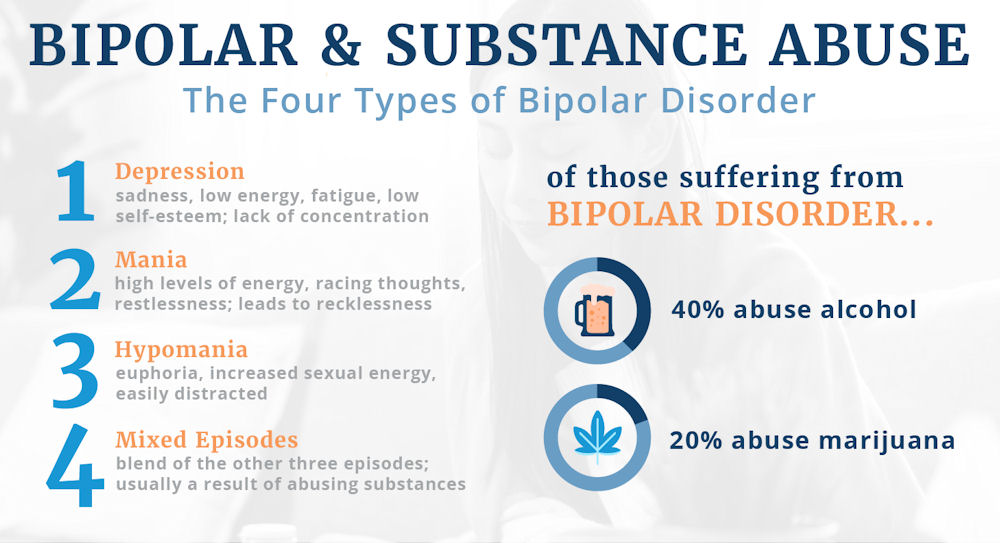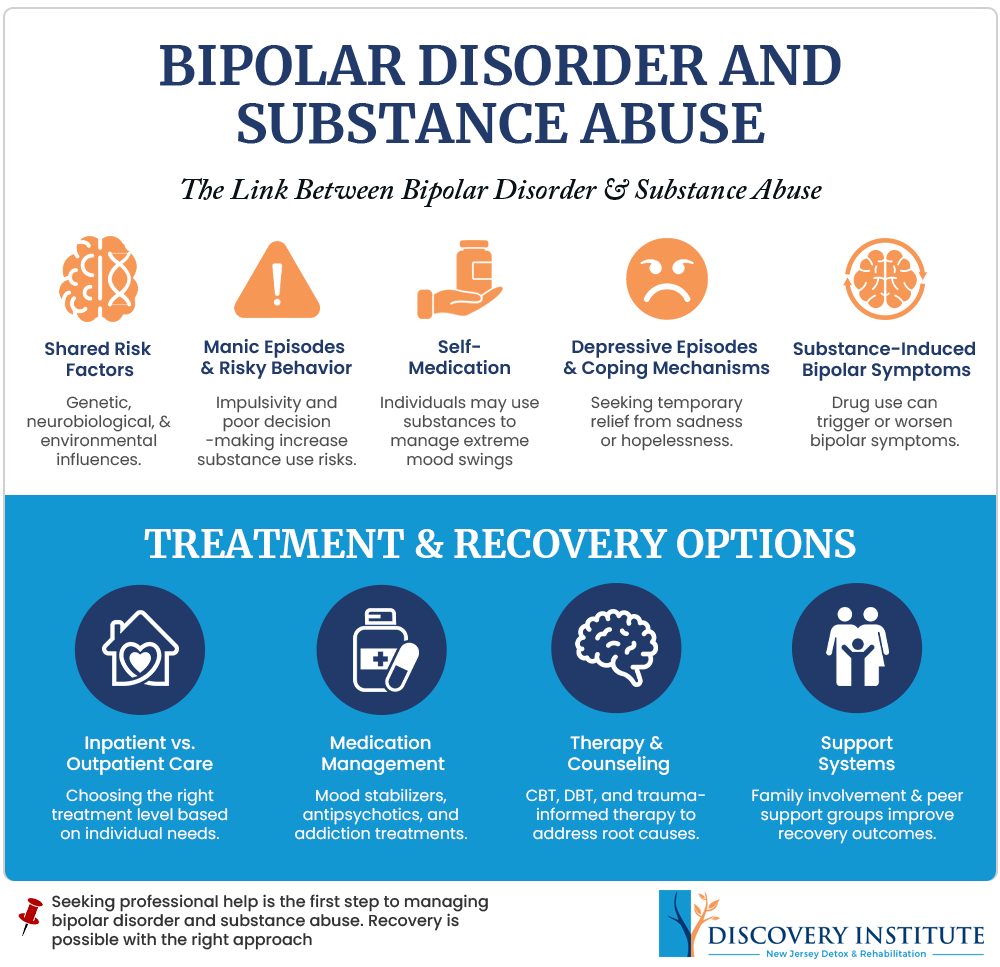Bipolar Disorder and Substance Abuse Treatment in New Jersey
Substance use disorders commonly coexist with bipolar disorder, impacting clinical outcomes significantly. The reasons for the heightened risk of addictive disorders in individuals with bipolar disorder remain unclear, but emerging data suggest shared underlying neurobiological and genetic factors. Treating bipolar disorder and addiction necessitates a comprehensive, multidisciplinary approach. Addressing the complexities of a mental health disorder and substance use disorder is referred to as dual diagnosis treatment.
Seeking advice from a mental health professional is essential for those who are deciding between inpatient or outpatient treatment for mental health disorders. It is crucial to understand that each patient’s experience with their condition is different, so personal circumstances should be carefully considered.
By consulting with experienced behavioral healthcare providers, patients can be confident that their best interests are being taken into account during this challenging time. These professionals have the knowledge and tools to help psychiatric patients determine the most appropriate treatment approach, guiding them toward recovery.
The decision to seek assistance for bipolar disorder can be filled with apprehension and doubt, mainly due to the societal stigma linked to mental health conditions. Nevertheless, it is essential to recognize that bipolar disorder is a legitimate medical issue that necessitates medical intervention. Overcoming the stigma entails acknowledging that mental well-being is just as crucial as physical health and that seeking help demonstrates strength, not weakness. Sharing your worries with a trusted friend or family member can offer valuable support.
The primary methods for managing bipolar disorder include medication, therapy, and self-management techniques. The level of care needed for bipolar disorder will vary based on the severity of symptoms, as well as individual requirements and circumstances. Frequently, a combination of inpatient and outpatient services proves to be the most beneficial solution. Here are the keys to knowing if inpatient bipolar treatment vs outpatient bipolar treatment is right for you or a loved one.
- Inpatient programs cater to individuals with severe symptoms necessitating round-the-clock care and supervision.
- Residential treatment typically encompasses medication administration, therapy sessions, and a well-organized daily routine aimed at stabilizing mood and ensuring utmost safety.
- Inpatient programs encompass a range of settings, including psychiatric hospitals, specialized units for bipolar disorder, and residential facilities.
- Outpatient rehabilitation offers greater flexibility, enabling individuals to reside at home while participating in therapy and group sessions either during the day or in the evening.
- Outpatient programs may be particularly beneficial for individuals transitioning from inpatient care or for those dealing with milder symptoms.
- Outpatient services are available at various locations, including hospitals, community mental health centers, and private practices.
Remember, you are not alone, and there are individuals and resources ready to assist you on your path to recovery. When pursuing treatment for bipolar disorder, it is crucial to be aware of the various treatment options available. Not every treatment is effective for everyone, and determining the most suitable approach may involve some trial and error.
Finding the Right Treatment Program At Discovery Institute
Every individual requires a unique approach to treatment for mental health disorders. Psychiatric conditions such as depression, bipolar disorder, and substance abuse necessitate tailored therapies that consider the individual’s lifestyle and the severity of their condition. In the modern era, there are various treatment options available, including inpatient and outpatient programs. These programs provide different levels of support to patients throughout their recovery journey.
The expanding range of treatments for different mental health disorders offers patients and healthcare providers more choices than ever before to address these conditions effectively. However, the abundance of options can sometimes lead to confusion for those seeking treatment.
It is crucial to understand the distinction between inpatient and outpatient care, along with their respective advantages. At Discovery Institute in Marlboro, NJ, we educate our clients and their caretakers to make informed decisions regarding their treatment and recovery plans.
What is Bipolar Disorder?
Bipolar disorder is a mental illness that causes a person to have extreme shifts in moods. It affects roughly 1.5% to 2.5% of the population. Chemical imbalances in the brain cause these extreme shifts. This could be due to genetics or even a traumatic event in someone’s life. They are often referred to as “episodes” and can last for days or weeks.
Depending on the individual, episodes can occur several times a week or only a few times a year. The extreme nature of these imbalances in moods greatly affects a person’s energy level and ability to focus. Substance abuse can make these imbalances even more severe.
Types of Bipolar Disorder
Bipolar disorder is a mental health condition that causes extreme mood swings. Understanding bipolar disorder starts with recognizing the different types. There are several types of bipolar disorder, each with its unique characteristics:
Bipolar I
Bipolar I involves one or more manic episodes, sometimes followed by hypomanic or major depressive episodes. Manic episodes last at least a week and are severe enough to require immediate medical care.
Bipolar II
For someone with this type of bipolar disorder, one or more major depressive episodes typically occur along with at least one hypomanic episode. Hypomanic episodes are similar to manic episodes but less severe.
Cyclothymic Disorder (Cyclothymia)
Cyclothymia involves periods of hypomanic symptoms and periods of depressive symptoms lasting for at least two years (one year in children and adolescents). However, the symptoms do not meet the diagnostic requirements for a hypomanic episode and a depressive episode.
Other Types
Bipolar and related disorders due to another medical condition, such as Cushing’s disease, multiple sclerosis, or stroke. Another type of bipolar disorder is called drug abuse-induced bipolar and related disorder, which is directly caused by substance abuse or due to the side effects of a medication or other treatments.
Each type of bipolar disorder has different symptoms and requires different treatment strategies. Therefore, a correct diagnosis is crucial for effective management of the condition.

Bipolar Disorder Episodes
- Depression or depressive episodes: These symptoms are similar to the clinical definition of depression. A person will feel sad, low energy, and have low self-esteem. They will also withdraw away from interests as they have little ability to concentrate. They may also eat very little, or another extreme is over-eating.
- Mania or manic episodes: Someone experiencing a manic episode will have extremely high energy, racing thoughts, and overall restlessness. Their excitement and enthusiasm levels will also be elevated. This is dangerous as it can cause them to be reckless and risky due to their careless attitude.
- Hypomania or hypomanic episodes: These symptoms are similar to mania; however, the individual is not acting as extreme as in a manic episode. These episodes also typically last only a few days.
- Other mixed episodes: Some individuals will suffer from a blend of these episodes. It is usually due to the use of alcohol and drugs that could be triggering more chemical imbalances.
Bipolar disorder can even be brought on by substance abuse. Drug use changes chemical balances in the brain, most notably, the reward center that makes using drugs feel good. Because of continued or excessive use of a substance, it can have the ability to rewire parts of the brain that affect your overall mood and actions. Sadly, even a person who has no previous issues with a mental illness can develop bipolar disorder due to drug use.

How Does Bipolar Disorder Develop?
The development of bipolar disorder is usually attributed to a combination of genetic, environmental, and physiological factors:
- Genetic factors: Bipolar disorder tends to run in families, suggesting a genetic component. Genetic factors account for approximately 80% of the cause of the condition.
- Brain structure and functioning: Some experts believe bipolar disorder is partly caused by an underlying problem with specific brain circuits and the functioning of brain chemicals. Three brain chemicals — norepinephrine, serotonin, and dopamine — are involved in both brain and bodily functions.
- Environmental factors: Certain life events and experiences can trigger bipolar disorder in people who have a genetic predisposition. Some experts believe that experiencing a lot of emotional distress as a child, such as trauma or abuse, can cause bipolar disorder to develop.
- Age and onset: Most of the time, bipolar disorder symptoms start during late adolescence or early adulthood. Occasionally, children may experience bipolar disorder symptoms. The disorder can occur at any age, although it often develops between the ages of 15 and 19 and rarely develops after 40.
While the exact cause of bipolar disorder is unknown, it is generally accepted that it is the result of a complex interplay of genetic, physiological, and environmental factors.

Bipolar Disorder and Substance Abuse: A Common Dual Diagnosis
Unfortunately, it is very common for people suffering from bipolar disorder to become victims of substance use disorders. It has been found that around 42% seek out alcohol, and 20% will abuse marijuana.
Typically, people with bipolar disorder are genetically predisposed to alcohol use disorder at somewhere between 47%-57%. This means that the disorders are in some way genetically related.
Also, the traits that a person with bipolar disorder develops, elevate the chances they will engage in substance abuse.
These traits include:
- Inability to cope with stress or stressful situations
- Engaging in excessive reward-seeking activities that occur with mania
- Impulsive behaviors
- Searching for release from depressive episodes
A basic explanation of why a person who has bipolar disorder would look for relief in drugs or alcohol is because they are simply looking to alleviate the symptoms of mental illness. However, people engaging in this behavior may be causing more chemical imbalances by trying to self-medicate.
It is often difficult to diagnose someone with bipolar disorder and substance abuse. Many individuals are not forthcoming about their drug and alcohol addiction, and family and friends may only see the depressive episodes. Therefore, the individual only gets treated for depression.

Can Drug Or Alcohol Abuse Cause Co-Occurring Disorders to Develop?
Substance abuse does not cause bipolar disorder to develop, but it can trigger or worsen bipolar symptoms in individuals who already have the condition. Drug abuse and addiction can cause changes in the brain that lead to bipolar disorder symptoms. Even people who were mentally healthy before their addiction can start to exhibit these symptoms.
Substance use disorders (SUD) are highly prevalent in bipolar disorder (BD) and significantly affect clinical outcomes. Substance abuse also significantly increases the risk of a person with bipolar disorder stopping their medication, which can trigger a recurrence.
However, while drug abuse can make the symptoms of bipolar disorder more severe or frequent, it does not directly cause the disorder. Some medications, drugs, and alcohol may cause you to experience some bipolar moods and symptoms. Numerous studies have reported a connection between alcohol and drug abuse and bipolar disorder.
How Do I Know If I Have Bipolar Disorder?
As we’ve stated before, bipolar disorder is characterized by extreme mood swings that include emotional highs (mania or hypomania) and lows (depression). Recognizing the signs can be the first step toward getting diagnosed and treated. Here are some of the common symptoms associated with this condition:
Manic or Hypomanic Bipolar Symptoms:
- Feeling very up, high, elated, or extremely irritable or touchy
- Increased activity, energy, or agitation
- Exaggerated sense of well-being and self-confidence (euphoria)
- Decreased need for sleep without experiencing fatigue
- Racing thoughts, talkativeness, and rapid speech
- Poor decision-making, such as making grandiose plans or engaging in risky behavior
Depressive Bipolar Symptoms:
- Feeling very down or sad
- Feeling hopeless or having a lack of energy
- Low self-esteem
- Difficulty concentrating or remembering
- Sleeping too much or too little
- Thoughts of death or suicide
If you’ve experienced some or all of these symptoms, it’s important to see a healthcare provider. They will perform a physical exam, ask about your symptoms, and recommend blood testing to determine if another condition, such as hypothyroidism or a drug interaction, might be causing your symptoms.
Remember, only a healthcare provider can diagnose you with bipolar disorder. If you think you may have this condition, it’s essential to seek help promptly.
Addiction and Bipolar Disorder Treatment: Getting the Proper Diagnosis
Dual diagnosis is the very first challenge in caring for people suffering from this co-occurring mental health condition. Next is finding an effective treatment for all bipolar symptoms. A medical specialist must be evaluated to make a thorough assessment. Receiving a proper bipolar disorder diagnosis is crucial for multiple reasons:
- Appropriate treatment: Bipolar disorder and substance abuse are complex conditions that require specific treatments. A correct dual diagnosis can help healthcare providers develop an effective treatment plan, which may include medication, therapy, lifestyle changes, or a combination of these to treat bipolar symptoms.
- Understanding the condition: A proper dual diagnosis can provide clarity to the individual and their loved ones about what manic or depressive symptoms the person is dealing with. It helps in understanding the symptoms, triggers, and measures needed to manage bipolar disorder.
- Reducing misdiagnosis: Bipolar disorders can often be misdiagnosed because they share similar symptoms with depression and anxiety disorders. However, the treatments for these conditions are different. Therefore, a correct diagnosis can prevent ineffective or potentially harmful treatments.
- Preventing comorbidity: Substance abuse often co-occurs with bipolar disorder. Without a proper diagnosis, one condition can exacerbate the other, leading to a more severe overall mood disorder.
- Reducing the risk of suicide: Both bipolar disorder and substance abuse increase the risk of suicide. Early diagnosis and bipolar disorder treatment can significantly reduce this risk.
- Improving quality of life: With the right treatment and support, individuals with bipolar disorder and substance abuse can lead fulfilling, productive lives. Without a proper diagnosis, they may continue to struggle with unmanaged bipolar symptoms.
A proper diagnosis is essential to manage bipolar disorder and find recovery from drug and alcohol abuse. It is essential for the well-being and long-term health of the individual who receives the integrated treatment that bipolar disorder requires.

CONTACT US
Find out how we can help
Our compassionate counselors are standing by to answer any questions you may have. After helping thousands of people over the last 50 years, we have the resources to help you and your family and all your individual needs.
Diagnosing Bipolar Disorder and Substance Abuse
When considering if you or a loved one may have bipolar disorder, these are some things to consider:
- When did the symptoms of bipolar disorder become noticeable?
- How long does the person typically suffer from manic episodes?
- How long does the person typically suffer from depressive episodes?
- What type of reckless or self-harming behaviors has the individual initiated?
- What type of substances has the individual used to self-medicate this mental health condition?
- How long has the person been involved in illicit drug abuse or alcohol abuse?
An experienced specialist will take into consideration all factors and take a multi-faceted treatment approach. Everyone who suffers from this dual diagnosis is very different. Many symptoms of bipolar disorder and addiction overlap; only a professional will know what to look for.

Treating Bipolar Disorder and Addiction
In any dual-diagnosis situation, it is important to treat both conditions at the same time. It should be noted that bipolar disorder is a lifelong condition, so treatment will be aimed at managing the symptoms. Addiction therapy will be done through either inpatient or outpatient rehab.
Medication is typically recommended for someone suffering from bipolar disorder. A comprehensive treatment plan often encompasses several medications. Due to substance abuse, doctors are reluctant to prescribe certain medications like benzodiazepines for anti-anxiety due to the risk of abuse.
Typical medications may include:
Typical medications used to treat bipolar disorder include mood stabilizers, antipsychotics, and sometimes antidepressants.
Mood stabilizers are often the cornerstone of treatment for bipolar disorder. They help control the manic and depressive episodes associated with the condition. Examples include:
- Lithium (Lithobid) – Often used for controlling manic or hypomanic episodes.
- Valproic acid (Depakene) or Divalproex sodium (Depakote) – These can be effective in treating less severe manic episodes.
- Carbamazepine (Tegretol, Equetro, others) – This is another type of mood stabilizer.
Antipsychotic medications are also used, especially for severe cases. Examples include:
- Quetiapine (Seroquel), risperidone (Risperdal), olanzapine (Zyprexa), aripiprazole (Abilify).
- Lumateperone (Caplyta) and Lurasidone (Latuda) are other options.
For bipolar depression, Fluoxetine combined with olanzapine (Symbyax) is an option.
In the case of co-occurring drug abuse, medications like Buprenorphine, Methadone, and Naltrexone are commonly used to treat opioid use disorder.
For someone suffering from bipolar disorder and addiction, it’s important to note that each individual’s treatment plan can vary based on their specific symptoms and needs. All these medications should be taken under the supervision of a healthcare provider due to potential side effects and the risk of dependency.
Therapy is the biggest part of any outpatient or inpatient program at Discovery Institute. They spend the bulk of their day in different types of therapy to address individual bipolar symptoms. We provide our clients with a variety of recovery techniques to make sure all needs are met.
Group therapy is very important because it lets everyone know that they are not alone in their struggle. They also have the opportunity to learn from someone else’s experiences. Everyone comes together in small groups to discuss the topics that are relevant to their recovery. This could include a discussion of their mental illness, substance use disorder, or even both.
Family Therapy seeks to minimize the conflict and tension between the individual suffering from bipolar disorder and addiction and their family. The idea is that through analyzing the patterns associated with the former problems, a trained therapist can help the family readjust those patterns so that there are no longer problems.
Families generally hold some resentment toward the person in recovery because of past instances where they were unable to control their bipolar disorder symptoms or substance abuse disorders. Family therapy works to bring families together and work towards forgiveness for everyone involved.
Individual therapy is part of both inpatient and outpatient treatment for substance abuse. It is a critical part of recovery and starts immediately once someone has begun the program. In this setting, the client has the opportunity to discuss details of their struggles with manic and depressive episodes that may be difficult to disclose to family or in a group therapy setting. This is truly an opportunity for the individual to get impartial feedback, release emotions, and process feelings to learn more about what led to their addiction.
Depending on the individual assessments, they may receive some specialized therapy, such as dialectical behavioral therapy or trauma processing.
Dialectical behavior therapy (DBT) is often used to help individuals learn how to cope with their bipolar disorder and predisposition to substance abuse. This method of therapy is closely related to Cognitive behavioral therapy (CBT). CBT generally focuses more on individuals who are suffering from substance abuse, whereas DBT is geared more toward dual-diagnosis patients.
Dialectical behavior therapy works by teaching patients coping skills and behaviors to better understand the extreme emotions that are often associated with bipolar disorder. Professionals work with patients to help them learn how to replace destructive thoughts and behaviors with positive actions and mindfulness exercises. Through this therapy, individuals learn how to handle intense emotions more productively. With repetition, they retrain their brain with healthy coping methods and slowly unlearn negative ones.
Trauma processing is also a useful therapeutic tool for individuals suffering from bipolar disorder and substance abuse. There are instances where a traumatic event may have led to the onset of bipolar disorder, or it is the reason for substance abuse, or even both. Therapists are trained to guide these clients through painful memories and emotions. Targeting triggers of traumatic moments helps clients learn what they are, and how to navigate those feelings outside of a therapy setting.
Getting Treatment for Bipolar Disorder and Addiction at Discovery Institute

At Discovery Institute our mission is to provide high-quality habilitation and rehabilitation services to all individuals suffering from bipolar disorder and substance abuse. Whatever type of program you are looking for, we can find something that can work for you. We know that living with co-occurring conditions like bipolar disorder and substance abuse can feel like it’s impossible to overcome. But you can, and we can help.
Contact us today to speak to one of our knowledgeable addiction treatment specialists. Find the freedom you truly deserve!



